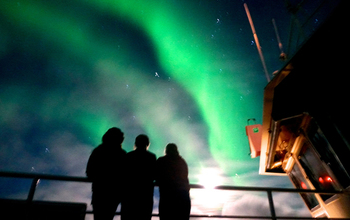Multimedia Gallery
Aurora borealis from deck of R/V Sikuliaq
The Aurora borealis as seen from the deck of the R/V Sikuliaq during a September 2016 research cruise to study how a changing climate may be affecting the entire way of life in the Arctic.
More about this image
In September 2016, the National Science Foundation (NSF) funded an Arctic research cruise aboard the R/V Sikuliaq that included scientific teams from Oregon State University (OSU) and the Virginia Institute of Marine Science (VIMS).
The purpose of the expedition was to understand how a changing climate may be affecting the entire way of life in the Arctic. Oceanographers from OSU and VIMS took water samples from the Beaufort and Chukchi seas to observe how microscopic plants, called phytoplankton, are living and dying in the late summer, when there is less sea ice and more frequent storms. The scientists worked alongside the Sikuliaq crew to collect data, which they will continue to analyze and interpret in their labs back home.
The Sikuliaq is owned by NSF and operated by the University of Alaska Fairbanks.
Read more about the September 2016 cruise in the OSU news story Altered Arctic: As the ice recedes, scientists seek signs of life in warming seas.
Or view a video Here. [Research supported by NSF grant OPP 15-04394.] (Date image taken: September 2016; date originally posted to NSF Multimedia Gallery: Jan. 23, 2018)
Credit: Kim Kenny
Images and other media in the National Science Foundation Multimedia Gallery are available for use in print and electronic material by NSF employees, members of the media, university staff, teachers and the general public. All media in the gallery are intended for personal, educational and nonprofit/non-commercial use only.
Images credited to the National Science Foundation, a federal agency, are in the public domain. The images were created by employees of the United States Government as part of their official duties or prepared by contractors as "works for hire" for NSF. You may freely use NSF-credited images and, at your discretion, credit NSF with a "Courtesy: National Science Foundation" notation.
Additional information about general usage can be found in Conditions.
Also Available:
Download the high-resolution JPG version of the image. (1.8 MB)
Use your mouse to right-click (Mac users may need to Ctrl-click) the link above and choose the option that will save the file or target to your computer.

 All images in this series
All images in this series